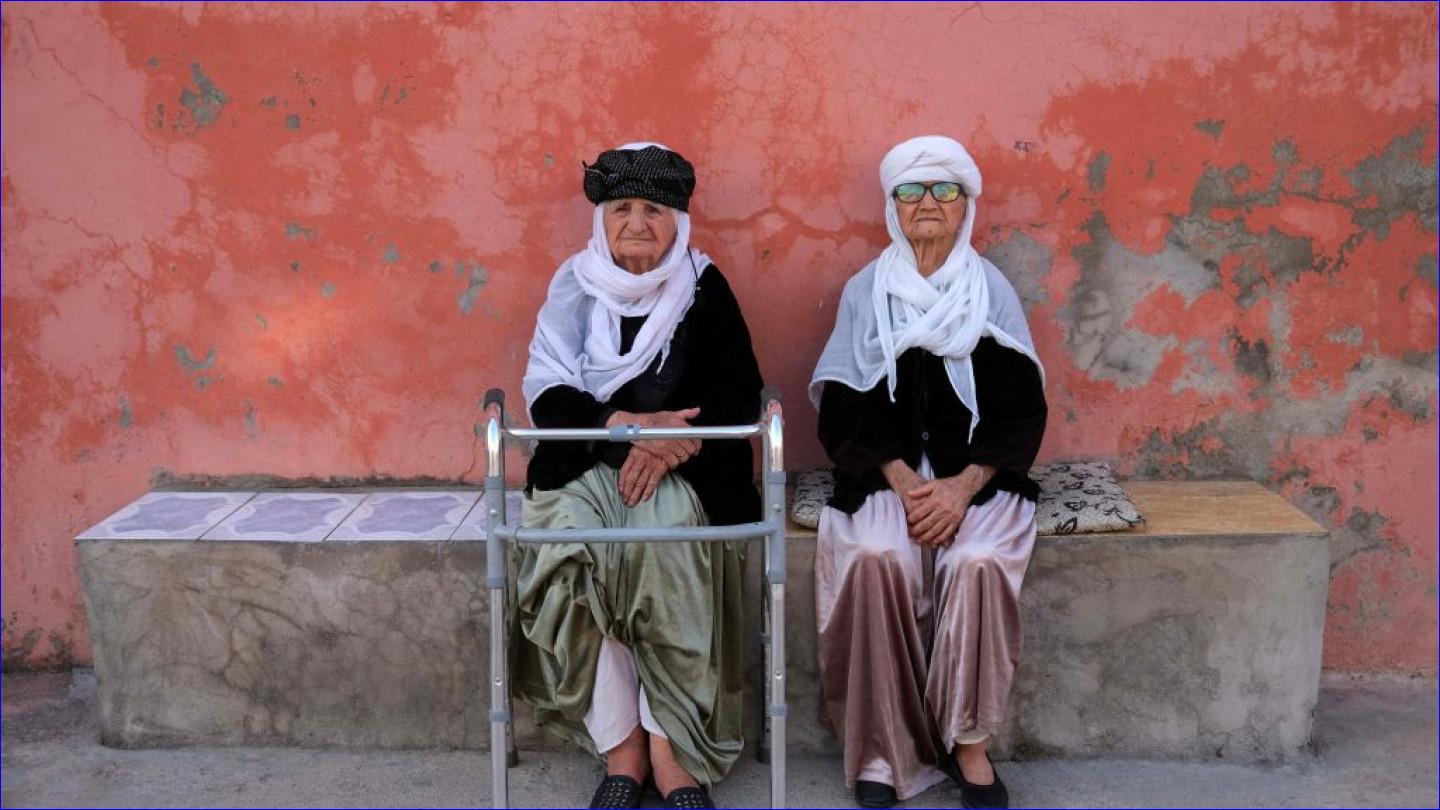


When the Islamic State group (IS) took control of Mosul in 2014 and declared its caliphate, Amina made the difficult choice to stay with her husband and children, contrary to the decision of many men in the village who sent their women and children to safer northern cities to protect their assets.
At the village entrance hangs a large banner commemorating Shabak martyrs killed in the fight against IS, led by the international coalition between November 2016 and July 2017.
However, Amina's child, who died of a genetic disease during the city's siege, is not pictured on the banner. The family had to bury the child in their garden before later transferring his remains to the village cemetery.
"If I could go back in time, I would have convinced my husband to flee with our children to a safer place. Preserving property cannot replace the loss of my child and the hardships we endured under IS and during the battles," says Amina sadly, as she looks out at her garden.
The Shabak minority, estimated between 250,000 to 400,000 individuals, have their own language and are primarily involved in agriculture and herding.
They are one of many minorities in Mosul, a city of nearly two million people and the largest hub in Iraq for various ethnic and religious groups, including Yazidis, Sunni and Shi'a Arabs, Christians, Chaldeans, and Turkmen, many of whom suffered ethnic cleansing at the hands of IS.
In contrast to Amina, Christian journalist and activist Wmeth Matti left Mosul as soon as IS entered the city. He returned during the liberation to cover the battle as a local correspondent, only to find his house turned into an operations room by IS fighters who had dug tunnels under it, causing extensive destruction.
Related: Timeline of ISIS in Iraq
Related: Attacks on Assyrians in Syria By ISIS and Other Muslim Groups
Deficient justice
"The Iraqi government commissioned a committee to assess the damage to homes in Mosul after the liberation battle, but its assessment was neither accurate nor fair," Matti said.
"Some minorities received substantial reparations due to connections with committee members, even among Christians."
There have been 35,000 claims filed by victims of the war against IS in Mosul, including thousands who lost their homes or relatives due to bombardments by the US-led coalition. Many are still awaiting reparations, like Amina.
Saib Khidir, a former member of the Iraqi parliament representing the Yazidis in Nineveh Governorate (Mosul's provincial capital), recounted challenges in coordinating reparations due to administrative obstacles exacerbated by the conflict between the central government in Baghdad and the Kurdistan Regional Government.
"This injustice faced by minority victims in Nineveh since liberation has been equally experienced by all minorities," said Qusay Abbas, a former parliamentarian for the Shabaks.
"So far, half of the victims have received no reparations at all, and some of the other half have received only partial amounts."
Coexistence among minorities
Moving between the suburbs and villages of Mosul requires passing through checkpoints, each controlled by fighters from different groups: Kurdish forces at the Kurdistan checkpoint, Christians near Al-Hamdaniya, and Shabaks near Burtala, alongside Iraqi forces mostly Sunni or Shi'a. Each district has minority fighters for defence after IS.
According to the Iraqi Constitution, minorities were granted seats based on a quota system. The Yazidis and Shabaks were each given only one seat, despite the Yazidis numbering over 500,000 in 2005.
Every 200,000 citizens should be represented by a member of parliament according to the Iraqi constitution.
These military and political changes have made conflicts worse among minorities, even within their own groups. IS violence against all minority groups in Nineveh has made each group try to become stronger.
Christians, split between Assyrian and Chaldean groups, faced violence from armed groups, especially during the 2008 attacks, which forced many to leave.
"We don't want to leave our land. We have to coexist in peace with other minorities, including within our own Christian community. The people want peace, but it's the politicians who create conflicts," said Wmeth Matti.
Qusay Abbas explained that Shabaks and Kakidis have faced severe injustice compared to other minorities, as they are deprived of expanding and owning new lands.
"Since 2003, we have faced issues with Christians who believe we are seizing their land and altering its demographics, but this is not true... We have tried to hold reconciliation sessions with the government, but so far, no solutions have been reached," Abbas said.
As for the Yazidis, who suffered severe violence from IS, their fighters joined the liberation battle and immediately after victory, some homes of Sunni families were burned, believing their sons had joined IS, resulting in 52 deaths.
"The sense of injustice was strong among Yazidis at that time, and there was chaos during the battle... It is the government's role to ensure justice for everyone, and Yazidis must seek their rights through legal means, not force.
"As long as these conflicts persist, they will be exploited politically," Saib Kidir said.
Looking towards the future
In Mosul, especially on Fridays, the lively green parks paint a picture of happiness despite challenges.
However, internal conflicts among different groups in Nineveh raise questions about its future. How do its people imagine a better tomorrow?
Saib Khidir believes transforming Sinjar into a governorate for Yazidis under Baghdad's authority would secure better rights.
"Sinjar is caught in a conflict between Erbil and Baghdad, as well as internal Yazidi conflicts... We must not surrender to these conflicts and promote peaceful coexistence," Khidir said.
Qusay Abbas proposes transforming Mosul into administrative districts representing each minority, particularly Shabaks, to establish a minority-governed Nineveh, activating Article 125 of the Constitution, which safeguards the basic and cultural rights of minorities.
As for Wmeth Matti, he argues that peaceful coexistence, bridging ethnic and religious divides, and embracing Iraqi statehood are essential for a brighter future in Mosul.
*/sup> Name changed to protect identity.

or register to post a comment.